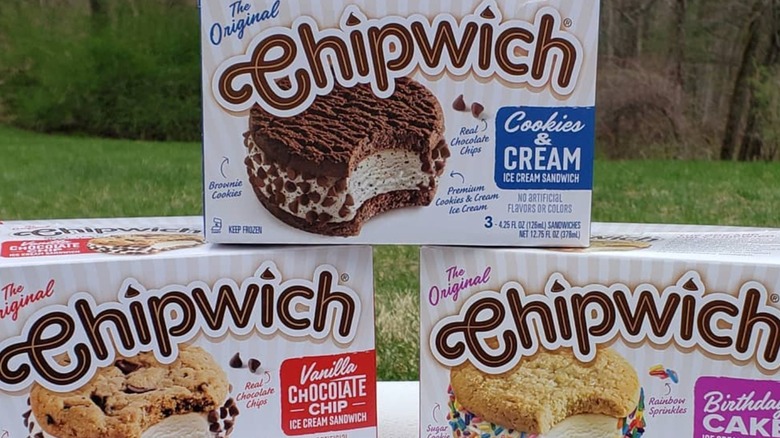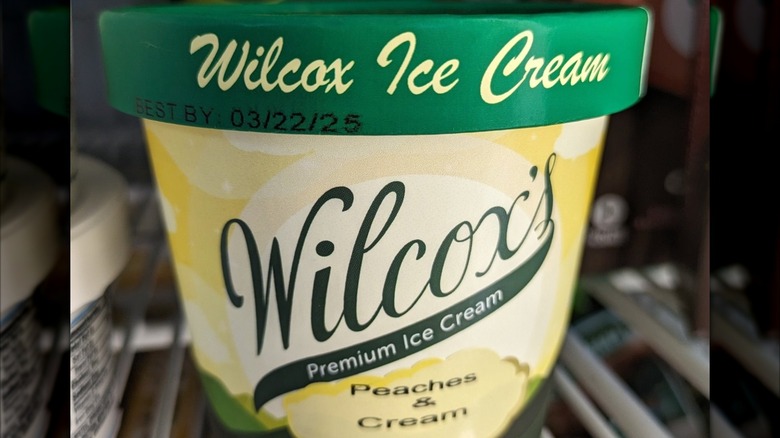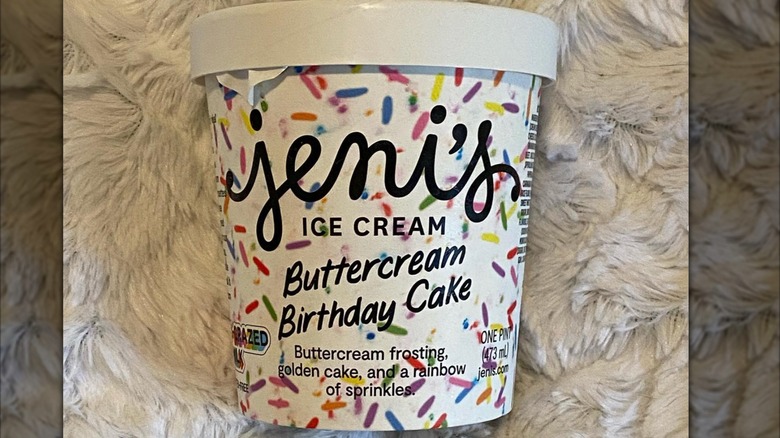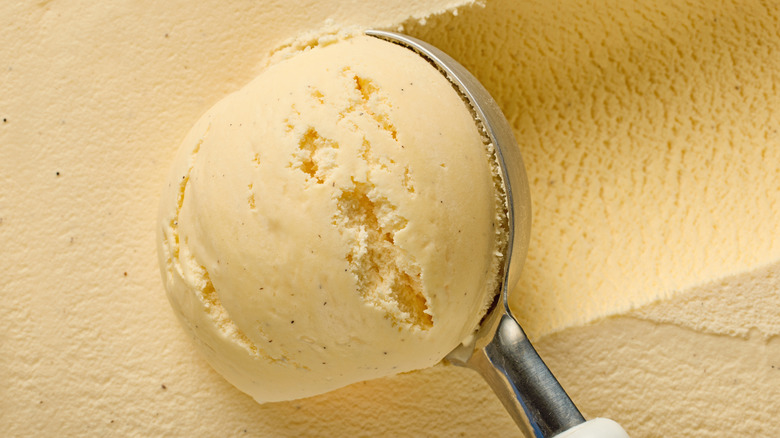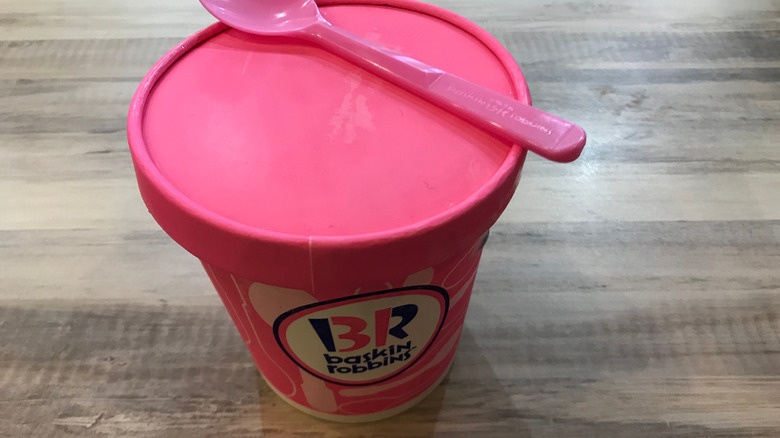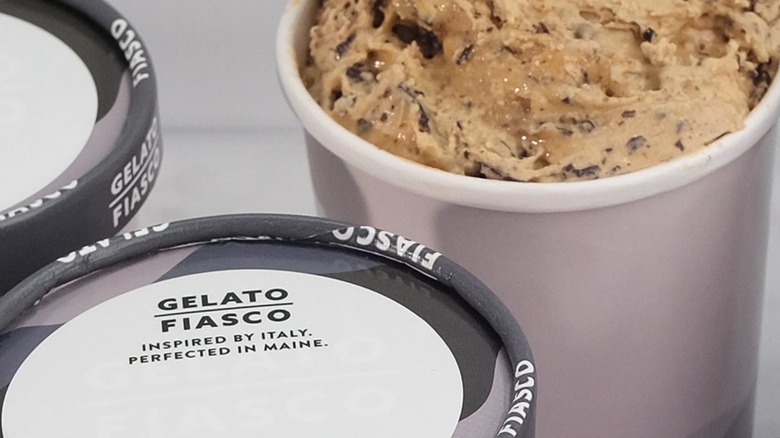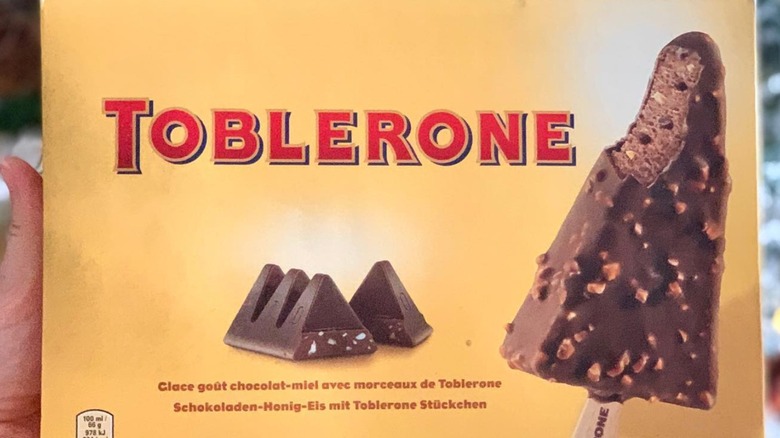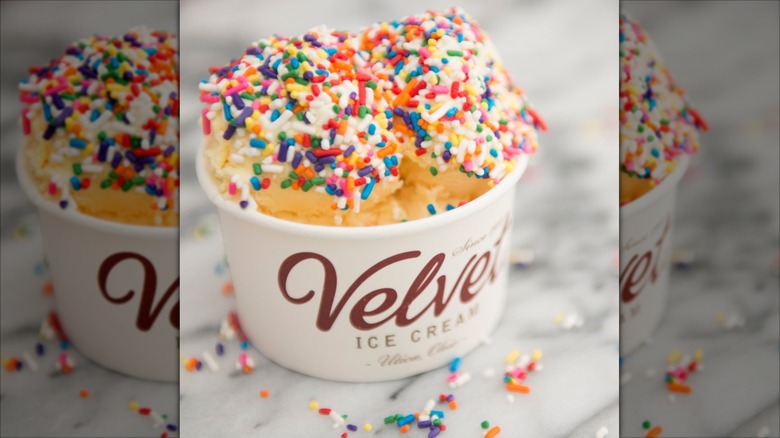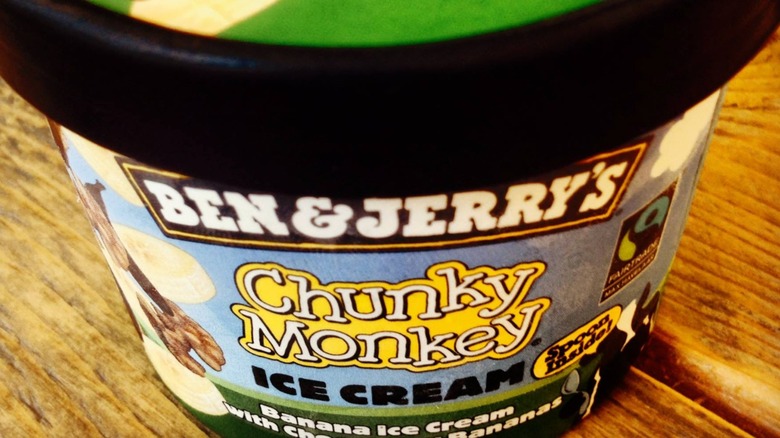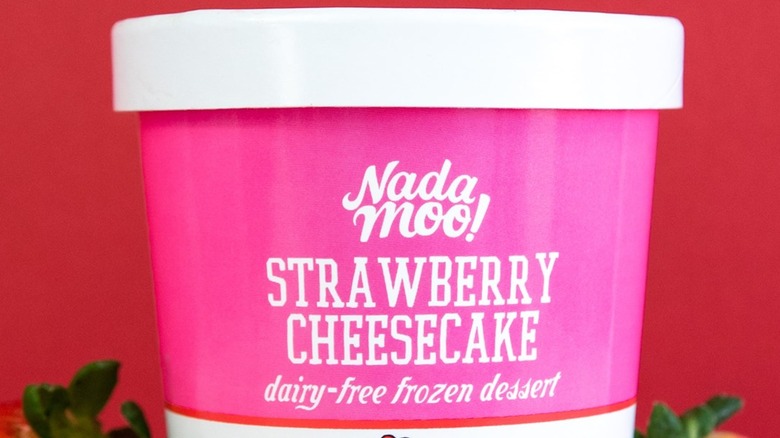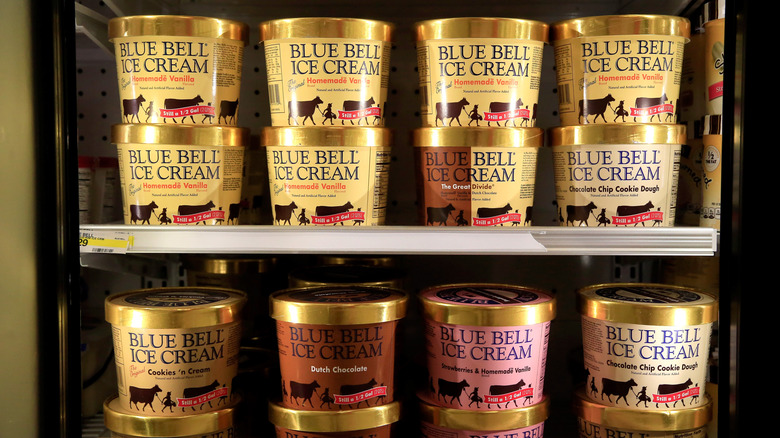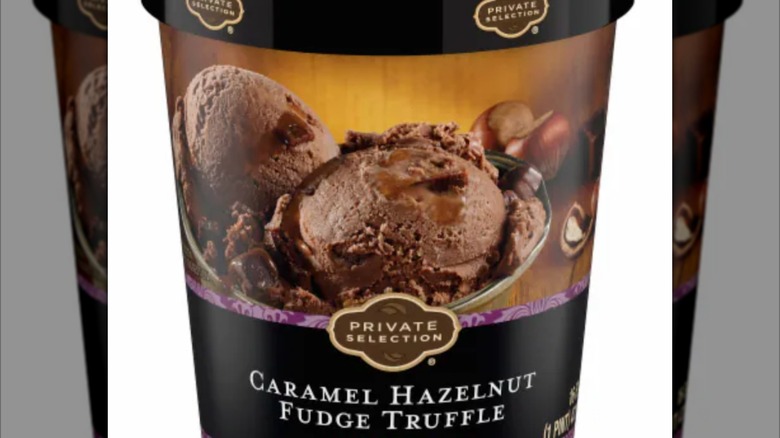Ice Cream Recalls That Affected Millions
With a history dating back thousands of years, ice cream was invented much longer ago than you'd think, and nowadays it seems like a dessert honed to perfection. Whether it's the best-ranked brands of vanilla ice cream found in any grocery-store freezer aisle, or once-popular ice cream flavors you hardly ever see anymore, this simple confection is beloved by fans around the world — and it can be made from little more than cream, sugar, and the time and effort it takes to churn.
Nonetheless, this is a food that requires a lot of attention. Not only can it be a challenge when figuring out how to eat ice cream without drips, stains, or messes — this confection is tough to manufacture, and it's even tougher to keep the product cold throughout its journey from the factory until the moment it hits your tongue. With the potential for lots to go wrong along the way, frozen desserts can be as tricky and dangerous as they are delicious.
The complex process of safely manufacturing frozen confections made with dairy or dairy alternatives in industrial facilities — not to mention shipping them across the nation — introduces many opportunities for ice cream to be tainted. Every so often, illness-causing bacteria take root and spread through ice cream products, or other contaminants find their way in. At the moment when it's discovered that a bad product reaches the public, ice cream companies spring into action to recall their tarnished treats to limit the damage and prevent further catastrophe. Here are some of the most significant and voluminous ice cream recalls in history.
Totally Cool recalled multiple brands for foodborne pathogen issues
Maryland-based ice cream manufacturer Totally Cool, Inc. produced many frozen confections that were marketed and sold by other, more famous brands. During a surprise inspection of Totally Cool's facilities in May 2024, U.S. Food and Drug Administration (FDA) officials uncovered contamination of Listeria monocytogenes, the germ that causes listeria infection. The foodborne pathogen can lead to fever, headaches, nausea, diarrhea, miscarriages, and stillbirths — and it can be deadly for the very young, the very old, and the immunocompromised.
Totally Cool announced a recall in June 2024, nationally withdrawing dozens of ice creams and ice cream-based items from the market, including ice cream cakes sold by Abilyn's Frozen Bakery and Friendly's, as well as ice cream cakes and novelties sold under the Hershey's brand name. Other products caught up in the recall included ice cream sandwiches and a Key lime pie-flavored frozen dessert from Jeni's, Cumberland Farms ice cream sandwiches, a line of Chipwich confections, varied Marco pints, and sorbet sold by The Frozen Farmer.
There were no reported cases of listeria infections related to consuming Totally Cool products when the recall was issued. However, this incident took a toll on the company's reputation, and in August 2024, Totally Cool filed for bankruptcy.
Wilcox ice cream and gelato was tainted with listeria
On November 14, 2023, Wilcox Ice Cream received word from the Vermont Department of Agriculture that a sample of its Super Premium Mint Chip variety, when subject to routine testing, tested positive for the germ that can cause listeria infection in human beings. Four days later, the Vermont-based ice cream company decided to act out of an abundance of caution and recall everything that it had produced and distributed during the same time frame that had resulted in a listeria-contaminated batch of Super Premium Mint Chip.
Everything that Wilcox made for months before the recall date was ordered back, encompassing 45 individual products. That included every style of Wilcox Premium ice creams in quart, pint, and gallon sizes, along with every Super Premium flavor in pints and 1.5 quart versions, six kinds of ice cream bars, gallon packs of a non-dairy dessert, and 10 flavors of gelato made under the spin-off brand name Leonardo's. The potentially infected products had been distributed to grocery stores and co-ops in New York, Massachusetts, New Hampshire, and Vermont.
Jeni's Splendid ice cream was possibly laced with metal
Jeni's makes thick and smooth specialty ice creams, and this high-end product is sold in carefully crafted flavors that often involve a lot of ingredients and mix-ins. The robust line consists of over 40 ice creams, including Buttercream Birthday Cake, created with real buttercream frosting, yellow cake, and sprinkles. However, the party was over for this festive flavor when Jeni's ordered a recall for it in November 2023.
Over the course of a recall spanning more than two months, Jeni's urged stores and customers to return five lots' worth of Buttercream Birthday Cake ice cream. Constituting just over 58,000 cases of product, that amounted to a recall of more than 467,000 individual paper cartons of birthday cake-flavored ice cream. Jeni's determined that it had to recall and destroy nearly half a million pints of ice cream because of a contamination issue. Somewhere along the line, pieces of aluminum and/or stainless steel had potentially entered the mix, which would be dangerous for consumers to unknowingly ingest.
Two companies issued recalls in 2023 because of egg contamination
Poultry eggs are one of the most prevalent food allergens. If anyone with an allergy or sensitivity to eggs ends up eating them, they may endure a rash, hives, nasal congestion, vomiting, and, in rare cases, potentially fatal anaphylaxis. In 2023, two separate ice cream manufacturers accidentally produced a large amount of product that included eggs as an ingredient — without noting that on the ice creams' packaging, leading to the possibility of someone with an egg allergy consuming those frozen desserts, believing them to be safe. That led to a dual recall of ice cream that was already distributed to hundreds of stores across the United States.
In August 2023, Pennsylvania-based Weis Markets recalled 48-ounce containers of its Weis Quality Brownie Moose Tracks Ice Cream, after it was discovered that a small amount of egg material may have been left on processing equipment that may have contaminated the confection. Although no illnesses were reported when the recall began, the company called for containers of this ice cream — sent to 197 Weis stores — to be returned.
A similar incident occurred in October 2023, when Yarnell Operations issued a voluntary withdrawal of Yarnell's Guilt Free No Sugar Added Homemade Vanilla Ice Cream. Three lots of the 1.5-quart size of this product may have contained trace amounts of eggs, introduced during production before containers were sent out to Walmart, Kroger, Hays, Cash Savers, Shoppers Value, G&W Foods, Superlo, and other supermarket chains in nine states in the South and Midwest.
Plastic and metal contamination affected numerous big-brand ice creams in Canada
In April 2022, Canadian food-safety officials announced a recall of 13 different types of ice cream sold across the country, all made in affiliation with the Quebec-based Agropur dairy cooperative. The market withdrawal included Baskin-Robbins ice cream in flavors including mint chocolate chip, vanilla, and chocolate mousse, as well as vanilla-flavored ice milk sold under the Best Buy brand name, ice cream products from President's Choice (including rocky road, vanilla, and mango flavors), and Hoof Prints light ice cream from Scotsburn Joins Farmers.
All of those products were deemed as unsafe for human consumption due to possible contamination of both plastic and metal fragments. However, Agropur subsequently stated that no reports of health issues were linked to the potentially tainted treats, and that no legal repercussions resulted from the wide-ranging recall.
Royal recalled many ice creams in 2022 over listeria fears
For almost a century now, the Royal Ice Cream Company produces various confections under several brand names primarily for the U.S. Northeast market. In early February 2022, the company announced a modest recall of three varieties of its Batch ice cream: vanilla, ginger, and mocha chip flavors, sold in pint-size paper cartons. No illness reports had been filed, but an FDA test found the presence of the germ that causes listeria on equipment used to make those batches of Batch. Those three flavors had been distributed to three grocery chains in Massachusetts and Connecticut.
Meanwhile, more testing on Royal-made ice cream commenced, and a week after the first product-withdrawal announcement, the ice cream manufacturer made its recall far more expansive. Royal publicly asked consumers and stores to help it stop the sale of many other ice cream varieties, due to additional positive listeria tests. From that point, the recall included every flavor of Batch products, along with confections sold under other brands like Highland Park Market, Maple Valley, Art Cream, and Gelato Fiasco, as well as Royal Ice Cream sold in half gallons and pints in all flavors, in addition to its ice cream cakes.
The recall also extended to ice cream sandwiches sold under the names Biggy Iggy, Chewy Louie, and Munson's, along with spumoni sold by Labriola's Italian Markets. Ice cream was pulled off the shelves across six Northeastern states, as well as in Louisiana, Florida, and Texas.
A toxic chemical led to a huge Nestlé ice cream recall in Spain
The global food conglomerate Nestlé is affiliated with the ice cream manufacturer Froneri, with their joint ventures including the production and distribution of various products in Spain. Among those frozen dairy treats are products bearing the names and flavor profiles of other famous brands, such as Milka, Toblerone, Princesa, Smarties, La Lechera, and Oreo. In July 2021, a total of 46 Froneri-made ice cream products were part of a recall organized and enacted by the consumer protection organization that serves the Andalusia region of Spain. The reason: All of those ice creams were potentially laced with ethylene oxide — a gas used in the industrial production of antifreeze, detergents, and plastics, which can also be used to sterilize machinery. Symptoms of consumption include irritation of the lungs, throat, nose, eyes, and skin, and it's a known carcinogen related to the development of breast and lymphoid cancer.
Urged by the Spanish authorities to remove its ice cream from the market, Froneri went through with the recall of impacted batches. However, the company insisted that even if ethylene oxide had managed to contaminate its products, it would've been in such small quantities that it wouldn't lead to a public health disaster.
Listeria fears prompted a Velvet ice cream and sherbet recall
Velvet Ice Cream makes frozen desserts in a wide array of sizes, flavors, and styles for varied stores and food-service companies, while also distributing ice cream and sherbet under its own name. When Listeria monocytogenes was detected in Velvet ice cream in March 2021, a recall was launched the following month that involved almost 100 individual products. Velvet called back all this ice cream as a safety measure after determining that some of its products may have been exposed to the pathogen that leads to listeria infection.
Included in the recall list were multiple flavors made for varied brands and private labels, including Buehler's, Discount Drug Mart, North Star, Whale of a Pail, and Super Dip. The recall extended to more than 60 Velvet-branded products, including ice creams in flavors like caramel pecan, cookie dough, and cotton candy, along with several sherbets and ice cream sandwiches. At the time of the recall, neither the FDA nor Velvet were aware of any complaints or reports of listeria infection related to the products in question.
Ben and Jerry's allowed unwanted nuts into multiple ice creams
While the rumor that Ben and Jerry's dairy cows get massages may not be entirely true, the company does hold itself accountable to high ethical standards. Perhaps with this moral code in mind, Ben & Jerry's issued a voluntary recall in April 2019 when the company came to believe that some of its product had become contaminated with tree nuts — a common allergen that can cause anaphylaxis, an instantaneous reaction that causes the body to go into shock.
The ice cream maker's parent company Unilever issued a voluntary recall of 2.4-gallon containers of the Coconut Seven Layer Bar flavor, along with Chunky Monkey sold in pints, both of which were suspected of containing undeclared nuts. While both products featured standard-issue label warnings about the possibility of tree nuts being present in the ice cream, these flavors may have inadvertently included almonds, hazelnuts, and Brazil nuts, none of which were mentioned in the ingredients lists. Traces of such nuts had been found during production, leading to the nationwide recall of those two Ben & Jerry's varieties. Unilever blamed a nut supplier for the incident.
NadaMoo! was recalled because of almonds
The Little Red Rooster Ice Cream Company is one and the same as NadaMoo! — a brand of frozen desserts that aren't technically ice cream at all, because they don't contain cream or any other dairy product. In 2019, the vegan-friendly frozen food maker set into place a far-reaching recall that covered only one variety of its product, but which still affected hundreds of stores, including major grocery chains like Publix and Sprouts, and concerned tens of thousands of ice cream servings.
On April 1, 2019, Little Red Rooster voluntarily called for the return of 26,000 pints of its NadaMoo! Strawberry Cheesecake Non-Dairy Frozen Dessert. Consumers with an allergy or sensitivity to dairy often choose NadaMoo! because it's safe for them to eat, but that batch of frosty dessert wasn't okay for those with an allergy to tree nuts. Almonds are a tree nut, and a very small amount of them was used in the creation of this NadaMoo! flavor. To evoke the flavor of real cheesecake, the product contained small pieces of pie crust that were made with almond flour. Little Red Rooster neglected to note almonds in the ingredient list of that flavor, or include an allergy warning on the dessert's packaging. Someone with an allergy to tree nuts could have consumed the dessert and unwittingly triggered a serious — and perhaps even fatal — reaction.
Products made by Blue Bell were recalled due to listeria
Blue Bell Creameries originally didn't even sell ice cream. After starting out as a Texas butter-making operation in the early 1900s, the company became better known for its ice cream decades later — but Blue Bell issued its first-ever recall in 2015 due to the presence of a deadly germ detected in its frozen confections.
Beginning in February 2015, health officials in South Carolina and Texas tested Blue Bell ice cream products and determined that they contained listeria pathogens. Soon afterwards, the Kansas Department of Health and Environment concluded that five patients at the same hospital — all of whom were being treated for unrelated medical issues — had been infected with the listeria bacteria found in the Blue Bell products. It was discovered that all of the patients had drank milkshakes made with Blue Bell ice cream while they were hospitalized between January 2014 through January 2015. Three of these patients had died from listeria infection.
By mid-March 2015, Blue Bell announced a recall for the products in question, and shut down the production line at a Texas facility. However, Kansas officials discovered more listeria germs in Blue Bell ice cream manufactured in Broken Arrow, Oklahoma. On March 23, 2015, Blue Bell expanded its recall to include ice cream cups produced at that Oklahoma plant. Subsequent inspections at both the Texas and Oklahoma facilities revealed sanitation issues — including malfunctioning cleaning equipment and leaks that could lead to dirty water dripping into product mixtures — and Blue Bell was eventually ordered to pay more than $17 million in criminal penalties because of its involvement in this listeria outbreak.
A nationwide Kroger recall sent ice cream back because of egg traces
Kroger is a mega-chain that operates many supermarket networks across the United States. Through its stores, Kroger sells countless products under its house brand, Private Selection — and in April 2014, two varieties of ice cream with that designation were at the center of an expansive nationwide recall. Both ice creams were produced from a recipe that included eggs, an ingredient to which many Americans are allergic or sensitive. The packaging for those Private Selection ice creams didn't list eggs among the ingredients or provide a warning, which meant egg-allergy sufferers could have eaten the product and experienced a traumatic reaction.
One of the products was Private Selection Chocolate Hazelnut Mascarpone Ice Cream, sold in 31 states at Kroger-affiliated stores, including Kroger, Baker's, Fred Meyer, Fry's, King Soopers, City Market, Owen's, Pay Less, Scott's, Ralphs, Smith's, and QFC. The other was Private Selection Caramel Hazelnut Fudge Truffle Ice Cream, which had been distributed to supermarket chains in 15 states, including Kroger, Owen's, Pay Less, Scott's, and Food 4 Less. Before the recall, nobody reported falling ill because of these ice creams, but Kroger urged consumers who are allergic to eggs to refrain from eating those products and return them for a refund.

